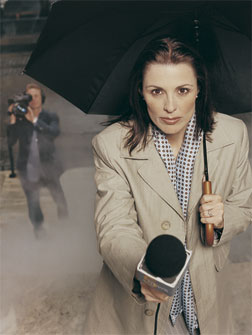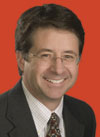 Wisconsin Lawyer
Wisconsin Lawyer
Vol. 82, No. 9, September 2009

Having a news reporter thrust a microphone in front of your face can trigger a wide range of reactions. Some people feel the urge to flee, while others love to linger in the limelight. Smart attorneys will succumb to neither extreme.
Nor will they underestimate the value of knowing how to deal with the media effectively, says Janine Geske, a Marquette University Law School professor and former Wisconsin Supreme Court justice who frequently serves as a law consultant for Milwaukee media.
Geske acknowledges that lawyers who spend a lot of time talking for a living might view media relations as a no-brainer. Talking is talking, after all, whatever the circumstances. “That is absolutely a pitfall for attorneys,” she says. “Some think there’s no special skill involved [in media relations]. But it takes a lot of professional skill.”
Here several people share their insights, based on their own experiences, about what works best when relating to news reporters.
Answer the Call
Lawyers can choose, of course, to sidestep reporters’ questions or rebuff requests for media interviews. But avoidance is an unwise strategy, advises Jim Haney, who for nearly a decade handled media relations for the Wisconsin Department of Justice during now Gov. Jim Doyle’s tenure as attorney general. Haney is now the interim dean of the College of Fine Arts and Communication at UW-Stevens Point, where he teaches undergraduate and graduate courses in public relations.
“Lawyers have to understand that if they’re involved in a case that has media interest, the story is going to be written with them or without them,” Haney says. “If lawyers don’t talk to the press, they’ll have no way of ensuring their message gets properly communicated. The reporter will go to somebody else.”
Being responsive and friendly to reporters is essential, agrees Susan Schellinger, a Milwaukee attorney whose practice areas include commercial litigation and insurance coverage. “Reporters have a job to do, just as we do,” she notes. “It’s important to return their calls promptly, even if you can’t make a comment.”
First and foremost, though, an attorney must honor a client’s wishes, emphasizes Schellinger, who works mostly with corporate clients who often handle their own media relations. “The last thing you want,” she cautions, “is to have your client irritated with you because you made a statement the client doesn’t like.”
In cases stirring intense media interest, lawyers may be hounded with phone calls requesting interviews. Madison criminal defense attorney Dean Strang has struck on a solution. He has a special email box to receive media inquiries on high-profile cases, and he then responds by email. He’s found reporters to be generally receptive to this “as long as they get a quick response,” he says.
This technique offers another plus, he adds. It helps safeguard his option to seek a change of venue in high-profile cases. “If I’m challenged or somebody says I stepped out of line, I want to be able to prove I didn’t generate adverse publicity [to justify a change of venue],” Strang explains. “By doing this through email, I have a record of what I was asked and what I said.”
Plan Ahead
Sometimes reporters approach an attorney to get a comment from an “expert” on a legal topic or on a case in which the attorney is not directly involved. When that happens, before you comment try to dig out clues on the real focus of the story, Geske suggests. Ask the reporter: What’s causing you to do this story now? Is there a particular case that’s the focus of your story?

If you don’t find out where the reporter is going with the story, says Janine Geske, “the risk is that you may think you’re talking about a general topic, when
actually the reporter has an agenda. Your quote might get used to support why a particular case ought to turn out a certain way.”
If you don’t find out where the reporter is going with the story, “the risk is that you may think you’re talking about a general topic, such as consumer fraud,” Geske explains, “when actually the reporter has an agenda. Your quote might get used to support why a particular case ought to turn out a certain way.”
Whether you’re commenting as an expert or talking about your own case, preparation is critical, says James A. Friedman, a Madison attorney and chair of the State Bar’s Media-Law Relations Committee. Think through in advance what the questions might be and how to respond. “I bounce ideas off colleagues: ‘Here are the points I want to get across, and here’s what I’m thinking about saying.’ I get others’ reactions,” he says.
That sort of preparation is especially useful for tough, even hostile, questions. “You’ll be much less likely to lose your temper or look angry about a question,” Friedman points out. “And it will help you avoid being critical of the other side. You want to be comfortable in explaining why you disagree, but you don’t want to come across like you’re ignoring or insulting others.”
Nix the ‘No Comment’
One of Strang’s guiding media-relations principles is to “never, never say ‘no comment,’” he says. “It makes you sound like a mob lawyer.”

“Lawyers have to understand that if they’re involved in a case that has media interest, the story is going to be written with them or without them,” Jim Haney says. “If lawyers don’t talk to the press, they’ll have no way of ensuring their message gets properly communicated. The reporter will go to somebody else.”
Research supports the notion that responding “no comment” puts you in a bad light, Haney points out. He’s seen polls showing that upon hearing someone say those two words, “two out of three people believe that person is either lying or covering up something,” he says.
So what if, in fact, you can’t make a public comment on a case? The key is to give a genuine reason why, Haney says. Responses may be something like, “That’s a great question, but I can’t answer it until we have more information,” or “Due to lawyer-client confidentiality concerns, I can’t tell you that.” “There are many ways to punt without using the dreaded ‘no comment,’” Haney stresses.
Before responding to a question, you also could ask to go “off the record” or “on background.” The Associated Press (AP) defines off the record as meaning that the information can’t be published. A reporter could use the information as a lead, however, and shop around to try to find a different source who can verify the information and is willing to go on record.
The AP defines on background as meaning that the information can be published, but only according to conditions set forth by the source. Usually the source wants to remain unnamed, but allows publication of a description of his or her position, such as “an assistant to the governor.”
Lawyers should proceed with caution, Geske warns, when giving out information they don’t want on the record – that is, attributed to them. Some years ago she participated in a panel with several media editors who were posed a number of “what if” scenarios. Ultimately, all admitted that if public interest concerns were strong enough, they would consider putting information on the record, despite promises to the contrary.
“I never forgot that,” Geske says. “Lawyers have to ask if they’re willing to take that risk. At times, I have done so, for one reason or another. It also depends on the relationship you have with the reporter.”

“I think lawyers can help reporters do their job well,” says Susan Schellinger. By failing to give a reporter some needed guidance up front, “you run the risk that he or she will report something inaccurately about your client. That’s going to be difficult, if not impossible, to rectify later.”
Sound Practices to Follow
Communicating effectively with the media demands special attention to a few practices:
Watch your vocabulary. Lawyers have a tendency to use legal jargon when commenting on a legal matter, points out Christopher Doerfler, who was a criminal defense attorney in Phoenix for 10 years before setting up a solo practice in La Crosse in 2007. But jargon-laden comments “don’t play well,” he says. “It would be like trying to have a conversation with a plumber who pulls out a wrench from his toolbox and starts shaking it at you. We lawyers have to learn to keep our tools in our briefcases and speak like people.”
Know when to stop talking. With a reporter hanging on your every word, it can be easy to “babble on,” says George W. Curtis, a personal injury attorney in Oshkosh. But when commenting on a case, make a statement that’s brief, concise, and quotable, he advises. “When I train young attorneys,” Curtis explains, “I tell them if they can’t describe their case in one sentence for the jury during voir dire, they’re not ready. It’s the same when talking to the media. You have to respect their time and space limits, and remember that your quote often will stand alone.”
Scrutinize the parts of the whole. “Think about what each of your sentences will look like in isolation,” Geske suggests. While it takes practice to get good at that, she notes, it helps to speak slowly and thoughtfully and to reflect in advance about what you wish to convey.
Use bridging carefully. Bridging is a technique for making sure your message gets through. A reporter asks a question, and you subtly steer your answer toward the point you want to make. For instance, “if your message is ‘my client is innocent,’” Friedman explains, “you would take advantage of whatever the question is to get that message across.”
But, he cautions, it takes considerable skill to finesse this technique. Poor execution makes you seem evasive. “You risk ticking off the reporter, number one,” he says. “And if you’re on television, you may look to viewers like you’re ignoring the reporter’s question.” Bridging often works better in an interview for a print story, he adds, because the reader doesn’t see what the reporter asked, only what the responder said.

“The ethics for lawyers are that you can’t say anything that you could reasonably foresee as affecting the fact-finders,” says Dean Strang. Toeing the mark entails “a huge judgment call, and it’s murky.”
Be willing to teach. “I think lawyers can help reporters do their job well,” Schellinger says. For instance, a lawyer might digest a 100-page pleading to give a reporter the gist of the case, or correct a reporter who misunderstands a judge’s decision and may take a story in the wrong direction. That sort of help takes a little time, but by failing to give a reporter some needed guidance up front, “you run the risk that he or she will report something inaccurately about your client,” Schellinger says. “That’s going to be difficult, if not impossible, to rectify later.”
Pitfalls to Avoid
Attempting to get your client’s position portrayed fairly in the media is one thing. Trying your case in the press is quite another. It can be easy to cross the line.
“The ethics for lawyers are that you can’t say anything that you could reasonably foresee as affecting the fact-finders,” Strang says. Toeing the mark entails “a huge judgment call,” he adds, “and it’s murky.”
Doerfler agrees, and that’s why he consults the applicable ethics rule (SCR 20:3.6) whenever he talks to the media about anything other than an extremely minor matter. “I pull up the ethics rules and read them, every single time,” he says, “because this area is a minefield. It would be easy to get yourself into trouble.”
To prevent that, Doerfler’s strategy is to restrict comments on a case to information already in the public record. He’ll make persuasive statements, but not argue. “I can string three facts together in a persuasive way,” he explains, “but if I conclude by saying those other people are wrong, I’m trying my case in the media. That becomes a problem.” [Editor’s Note: For a discussion of the Rules of Professional Conduct limitations on lawyers when interacting with the news media, please see the Ethics column, “Talking to the News Media about Civil Legal Matters,” elsewhere in this issue.]

Whenever he talks to the media about anything other than an extremely minor matter, “I pull up the ethics rules and read them, every single time,” Christopher Doerfler says, “because this area is a minefield. It would be easy to get yourself into trouble.”
Ethical violations aside, there’s another good reason to refrain from trying a case in the court of public opinion, Curtis points out. If, for example, you’re representing an individual in a major personal injury case against a large corporation, your pre-trial arguments that appear in the press may taint potential jurors. “The very people you want on the jury may end up getting disqualified,” he says. “You have an edge [in public sympathy], so you don’t want to blow it.”
Another mistake Strang notices attorneys making in criminal cases, on either side, is to comment in the media about the prospects of a guilty plea or plea agreement. Such an action is a “flat-out violation of the Supreme Court Rules, for one,” Strang says. “And, two, what could be more unfairly prejudicial for the client? What does it say, for instance, when the defense lawyer states, ‘We’re in plea negotiations’? It says the lawyer knows his or her client is guilty.”
Pros and Cons of Press Conferences
A news conference can be a good way to efficiently respond to several reporters at once when a case has intense media interest. Instead of doing 10 interviews back to back, you can prepare in advance and meet with 10 reporters at a news conference.
This also means you don’t have to wonder if you’re saying the same thing, the same way, in interview number six as you did in interview number one. In a string of interviews “you might start to deviate from your core message,” Haney explains.
Still, before even considering calling a news conference, “you must have something truly newsworthy to say,” Haney emphasizes. What’s more, a news conference should have two parts: presenting a prepared statement and fielding media questions.
“I’ve seen people hold a news conference, make a statement, and turn to walk off the stage saying they’re not taking questions,” Haney observes. “That’s not a news conference. Reporters have a right to feel cheated if they’re treated that way.”

“Wisconsin has a qualified reporter’s privilege that is entirely case-law driven. There’s nothing statutory,” explains James A. Friedman. That could change in the future if the Legislature adopts the Whistleblower Protection Act introduced in June 2009.
Strang has held press conferences in only one case in his 20-plus years as a criminal defense attorney: during the Steven Avery murder trial in 2007. The attorneys on both sides and the media agreed on an arrangement in which the prosecutors and the defense attorneys met with the media on alternating days, at the close of the day’s proceedings. “Then the media didn’t call us at our hotels at 10 at night,” Strang notes.
But, in general, Strang believes press conferences ought to be used sparingly. “If you’re thinking about holding a press conference,” he says, “don’t think just twice. Think three or four times about doing that, regardless of which side you’re on in a case, because you might be trying to manipulate public opinion through the media.”
Remember, It’s a Relationship
Dealing with the media is, first and foremost, about forming a relationship. After all, Haney points out, “they call it media relations for a reason.”
It takes time to build mutual trust and respect, but Haney warns, “if you mislead reporters or give them incorrect information, you’ll lose their respect quickly. And it will be very hard for you to get your reputation back.”
With fears of missteps and misinterpretations, it can feel intimidating to face the media, even for experienced attorneys. “The first few times you’re going to be scared to death,” Doerfler says. “You need to be extra prepared to stay on topic. You’re going to be nervous, and that’s okay. In fact, it’s probably a good thing.”
Wisconsin Lawyer
